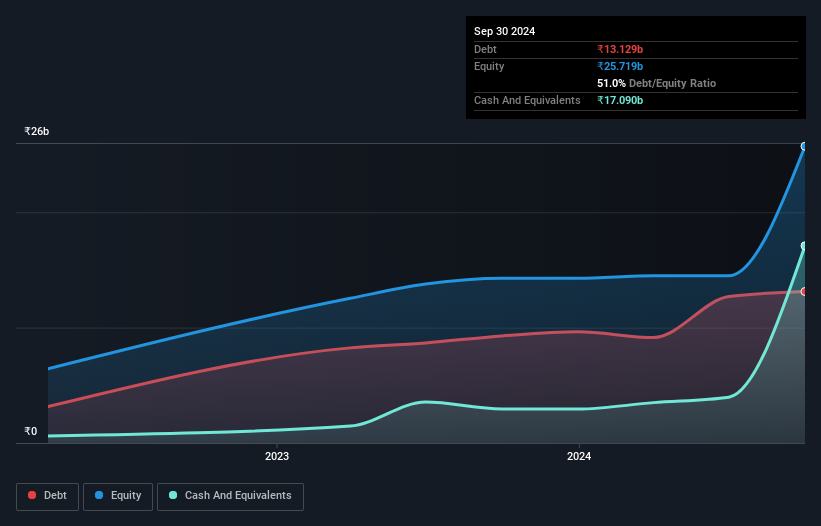The external fund manager backed by Berkshire Hathaway's Charlie Munger, Li Lu, makes no bones about it when he says 'The biggest investment risk is not the volatility of prices, but whether you will suffer a permanent loss of capital.' So it seems the smart money knows that debt - which is usually involved in bankruptcies - is a very important factor, when you assess how risky a company is. We note that Max Estates Limited (NSE:MAXESTATES) does have debt on its balance sheet. But the real question is whether this debt is making the company risky.
When Is Debt A Problem?
Debt assists a business until the business has trouble paying it off, either with new capital or with free cash flow. Part and parcel of capitalism is the process of 'creative destruction' where failed businesses are mercilessly liquidated by their bankers. However, a more common (but still painful) scenario is that it has to raise new equity capital at a low price, thus permanently diluting shareholders. By replacing dilution, though, debt can be an extremely good tool for businesses that need capital to invest in growth at high rates of return. When we examine debt levels, we first consider both cash and debt levels, together.
View our latest analysis for Max Estates
What Is Max Estates's Net Debt?
You can click the graphic below for the historical numbers, but it shows that as of September 2024 Max Estates had ₹13.1b of debt, an increase on ₹9.28b, over one year. However, its balance sheet shows it holds ₹17.1b in cash, so it actually has ₹3.96b net cash.

How Strong Is Max Estates' Balance Sheet?
We can see from the most recent balance sheet that Max Estates had liabilities of ₹12.0b falling due within a year, and liabilities of ₹25.7b due beyond that. Offsetting these obligations, it had cash of ₹17.1b as well as receivables valued at ₹167.8m due within 12 months. So its liabilities total ₹20.4b more than the combination of its cash and short-term receivables.
While this might seem like a lot, it is not so bad since Max Estates has a market capitalization of ₹86.7b, and so it could probably strengthen its balance sheet by raising capital if it needed to. But it's clear that we should definitely closely examine whether it can manage its debt without dilution. While it does have liabilities worth noting, Max Estates also has more cash than debt, so we're pretty confident it can manage its debt safely.
It is well worth noting that Max Estates's EBIT shot up like bamboo after rain, gaining 63% in the last twelve months. That'll make it easier to manage its debt. There's no doubt that we learn most about debt from the balance sheet. But ultimately the future profitability of the business will decide if Max Estates can strengthen its balance sheet over time. So if you're focused on the future you can check out this free report showing analyst profit forecasts.
Finally, a business needs free cash flow to pay off debt; accounting profits just don't cut it. Max Estates may have net cash on the balance sheet, but it is still interesting to look at how well the business converts its earnings before interest and tax (EBIT) to free cash flow, because that will influence both its need for, and its capacity to manage debt. During the last three years, Max Estates burned a lot of cash. While that may be a result of expenditure for growth, it does make the debt far more risky.
Summing Up
While Max Estates does have more liabilities than liquid assets, it also has net cash of ₹3.96b. And it impressed us with its EBIT growth of 63% over the last year. So we don't have any problem with Max Estates's use of debt. When analysing debt levels, the balance sheet is the obvious place to start. However, not all investment risk resides within the balance sheet - far from it. We've identified 1 warning sign with Max Estates , and understanding them should be part of your investment process.
Of course, if you're the type of investor who prefers buying stocks without the burden of debt, then don't hesitate to discover our exclusive list of net cash growth stocks, today.
New: Manage All Your Stock Portfolios in One Place
We've created the ultimate portfolio companion for stock investors, and it's free.
• Connect an unlimited number of Portfolios and see your total in one currency
• Be alerted to new Warning Signs or Risks via email or mobile
• Track the Fair Value of your stocks
Have feedback on this article? Concerned about the content? Get in touch with us directly. Alternatively, email editorial-team (at) simplywallst.com.
This article by Simply Wall St is general in nature. We provide commentary based on historical data and analyst forecasts only using an unbiased methodology and our articles are not intended to be financial advice. It does not constitute a recommendation to buy or sell any stock, and does not take account of your objectives, or your financial situation. We aim to bring you long-term focused analysis driven by fundamental data. Note that our analysis may not factor in the latest price-sensitive company announcements or qualitative material. Simply Wall St has no position in any stocks mentioned.
About NSEI:MAXESTATES
Max Estates
Develops and constructs residential and commercial properties.
High growth potential and fair value.
Market Insights
Community Narratives



